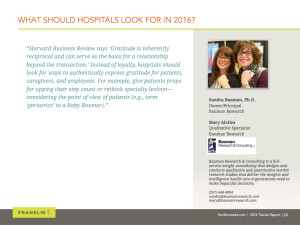2016 Predictions Mash Up Part 2: Gratitude Is More Actionable Than Loyalty
By Mary Aviles & Sandra Bauman
In our role as trend analyzers, we read a lot of trend research and at the beginning of each year we pay particular attention to the pundits and prosthelytizers. This is the second in our four-part series that features mash ups of some of our favorite predictions of 2016.
Gratitude is the next incarnation of loyalty. Or, put another way, what happens when customer delight meets health care and patient experience?
 Late last year our friends at Franklin Street gave us the opportunity to weigh in on their trends report with our take on health care for 2016. We chose to consider Mark Bonchek’s idea from the Harvard Business Review that customer gratitude trumps loyalty. In his article, Mark cites a Kitewheel study from 2014 that shows a disparity in how brands and consumers (or “choosers” to use Matthew Willcox’s term) think about loyalty:
Late last year our friends at Franklin Street gave us the opportunity to weigh in on their trends report with our take on health care for 2016. We chose to consider Mark Bonchek’s idea from the Harvard Business Review that customer gratitude trumps loyalty. In his article, Mark cites a Kitewheel study from 2014 that shows a disparity in how brands and consumers (or “choosers” to use Matthew Willcox’s term) think about loyalty:
Nearly three-quarters of consumers (73 percent) believe that loyalty programs should be a way for brands to show consumers how loyal they are to them as a customer; but two-thirds (66 percent) of marketers still see it the other way around.
Gratitude is so important because it’s got everything a good marketer wants. It’s:
- inherently reciprocal
- combines both emotion AND behavior
- can serve as the basis for a RELATIONSHIP beyond the immediate transaction
In the article Mark asks, “What would the world look like if brands were loyal to their customers?” We started to wonder that same thing, but in the context of health care. It seems like the perfect proving ground for this idea. What if healthcare providers were loyal to patients and their caregivers?
If every health care transaction were approached from a position of “shared purpose” imagine the possibilities for patient gratitude! This idea is founded on working with the patient/their caregiver. When we conducted our What Women Really Want From Health Care research, one of our key insights was that, in an ideal world, these women saw themselves in a shared role with their health care providers (“I’m Wonder Woman and he’s Superman; me and my provider should work together to decide what is best for me and my care.”)
When we talk about patient experience, we often focus on the relatively small opportunities for operationalization that can have significant impact. One example is making a conscious choice of terminology. We completed a study concerning the term ‘geriatrics.’ We found that the term (which is used to categorize an entire medical specialty) conjured some very specific negative associations for prospective patients that would absolutely turn them away from seeking this appropriate and needed specialized care because of how the patients saw–or, more importantly, didn’t see–themselves. It’s hard to develop a sense of shared care when even the terminology being used “doesn’t apply to me.”
Bonchek also identifies expressing authentic appreciation as a component to fostering gratitude. Mash up alert: who better to empower to show patients appreciation than the front-line staff? For the past several months we’ve been talking about applying Danny Meyer’s enlightened hospitality approach to market research. In doing so, it occurred to us that if health systems and hospitals developed a strategy for empowering their front-line staff, trained them in how to employ passive listening, and gave them the discretion to provide patients and their caregivers with “extras” and appreciation, patients would be so thoroughly delighted they would have no choice but to rave about and reciprocate with gratitude (and likely surprise as well)! Voila! Positive word-of-mouth! This may seem like a strategy that is already in place in health care, but unfortunately employee engagement remains a very real and unresolved opportunity for improvement for many systems.
Who is on the front lines in your organization? What can you do to empower them to identify and express authentic appreciation to your “choosers?”



